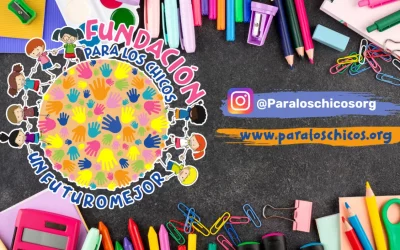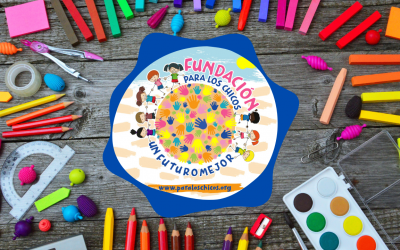With 12 schools under management and more than 3,000 beneficiaries, the organization supported by Aerodoc and its founding family seeks to help children, mostly from the Argentinian province of Santiago del Estero, obtain an appropriate education.
The proud look on a mother’s face as she sees her daughter learning what she never could. The joy in a girl that is now able to read and write and celebrates her good grades on school exams. Thousands of children like her (chinitas and changuitos, as they are called in northern Argentina) are witnesses to and beneficiaries of a newfound quality of life thanks to Fundación Para los Chicos Un Futuro Mejor (A Better Future For The Children Foundation), with support from Aerodoc.
This is taking place in Santiago del Estero, Argentina, where education is often elusive, food is inadequate, and the dreams and hopes for the progress of many fade away. Such is the field of operations of an organization seeking to ensure proper education, a healthy diet, and access to healthcare.
It all began 16 years ago, when the Mullers, Aerodoc’s founding family, got a letter from Selva, a rural teacher from Paraje Yacurmana, Santiago del Estero, asking for help. Selva’s letter moved Germán Muller and his family, and they set out to help her. However, they did not want to do a one-off, fleeting thing, but something bigger and more intricate.
This led the Mullers to consider setting up a foundation to help more people besides Selva. After reaching Santiago del Estero and starting operations, they became companions of many children – more than 3,000 to date.
The number of beneficiaries and actions is growing every day. Today, the foundation provides food, school supplies, and learning materials for 12 schools; assists 73 families by delivering food and hygiene items; provides drugs and clothing to four hospitals, and manages four Educational Support Centers to help the children. As its goals become more ambitious, the people’s hopes grow.
The beginning
After running into each other during a holiday trip, Aerodoc founder Germán Muller suggested its friend Eduardo Travaglini coordinate the project. It was a significant challenge for Travaglini, a teacher who had built a life in Buenos Aires.
After his first trip to Santiago del Estero, where we noticed a lot of potential, Travaglini decided to quit his jobs and devote all his time to the foundation. “What drew me was getting in touch with people from the hills and seeing their living conditions – they had no drinking water, no electricity, no connectivity. All those things that were a part of my daily life just weren’t there, and that had a huge impact on me,” says Travaglini.
“The main challenge was getting close to the locals, understanding how deep life can be in its simplicity, seeing the efforts made by children to get to school, because sometimes they must walk for miles to get there,” says Travaglini. Another challenge was finding the best, most transparent sourcing methods. This helped Fundación Para los Chicos connect with the educational community, physicians, teachers, and families.

A comprehensive proposition
The foundation’s projects and its scope of work have been expanding every year. The campaigns created to raise awareness on the subject and find more contributors to the project, an additional challenge, paved the way for more opportunities and countless new projects.
The foundation managed to double the number of schools it manages in a year to meet its initial key goal of promoting education. Later, it realized that a multi-pronged approach was needed. Food proved crucial: no mind can develop without a proper diet. The same applied to school supplies; the foundation looked for ways to expand basic learning materials to help teachers in a region where there are one or two teachers per school for all grades. Fundación Para los Chicos Un Futuro Mejor also included Educational Support Centers in three different locations so children could enhance their education.
Besides the mind and a proper diet, other key factors are hygiene and healthcare, even more urgently so since the onset of the pandemic. Aerodoc’s foundation began tackling these issues by supplying hygiene items for children and schools. Then, through an agreement with the University of Buenos Aires (UBA), it brought doctors to the region to get insights and use them to improve the children’s health even further.
“UBA’s physicians and interns also got in touch with hospitals because their work was key due to the lack of services in the region. We received various drug donations which we distributed among four healthcare facilities,” says Travaglini. The foundation also helps families in vulnerable situations by providing food and hygiene items, with an eye on their individual needs. This program currently serves 73 families with more than 365 members combined.
Lessons learned and future outlooks
According to Travaglini, Fundación Para los Chicos Un Futuro Mejor aims to build upon the foundation that has already been laid, “from families and schools to hospitals,” while pursuing new projects, like installing a cell antenna in La Cañada to provide internet access to locals so teachers can do their jobs and children can learn.
The latest project was an innovation called “protein blocks,” candy-shaped supplements which provide essential nutrients for the children’s cognitive and all-around development. “We created a couple of those blocks together with locals and distributed them among families.”
With these projects, Fundación Para los Chicos helps those in need to take one more step in their educational, nutritional, and sanitary evolution. “Every child has potential and dreams. Our job as adults is devoting ourselves to fulfilling those dreams and realizing that potential,” says Travaglini.




